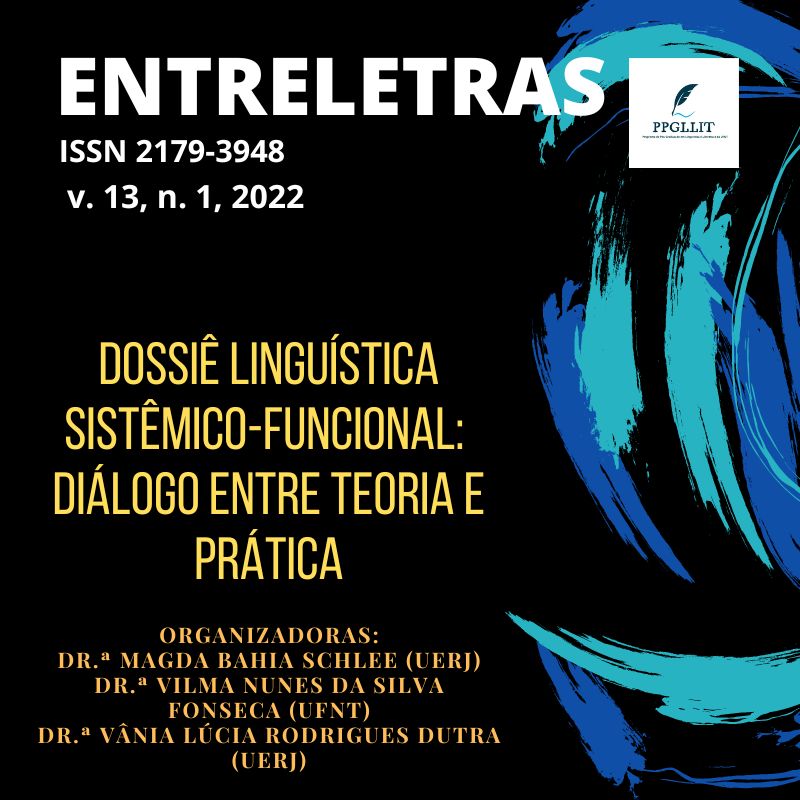“RAPE WITHOUT INTENT"
THE TRANSITIVITY SYSTEM IN THE MARIANA FERRER'S JUDICIAL REPRESENTATION IN THE LIGHT OF THE SYSTEMIC-FUNCTIONAL LINGUISTICS
DOI:
https://doi.org/10.20873/uft2179-3948.2022v13n1p208-228Keywords:
systemic-functional linguistics; ideational metafunction; judicial testimony; representation of the female imageAbstract
This study proposes to observe the representation of Mariana Ferrer, young who, in 2018, recorded a report of occurrence reporting having been drugged and raped in a luxury establishment in Florianópolis/ SC through the analysis of the court statements of the procedural book. So, the main goal is, through the transitivity system, to analyze the language used by the deponents to build representations of Mariana in fifteen testimonies through the selection of processes and thematic roles present in the passages related to the moments close to the event. The theoretical framework is based on the works of Halliday and Matthiessen (2014) and Fuzer and Cabral (2014), in the light of the contribution of Systemic-Functional Linguistics, which describes and analyzes the language from the potential choices of the speaker/writer. In the legal discourse, the analysis of choices in lexicogrammar made by speakers in favor of their views revealed a tendency to represent it from behavior patterns that meet socially established models.
Downloads
References
BRASIL. Poder Judiciário da Comarca da Capital do estado de Santa Catarina (3. Vara Criminal). Ação Penal - Procedimento Ordinário/PROC. Autos n° 0004733-33.2019.8.24.0023. Autor: Ministério Público do Estado de Santa Catarina. Réu: André de Camargo Aranha. Relator: Juiz Marcos Rudson. Florianópolis, set. 2020, p. 3602-3652.
FUZER, C. & CABRAL, S. R. S. Introdução à gramática sistêmico-funcional em língua portuguesa. 1. ed. Campinas: Mercado das Letras, 2014.
FUZER, C. Linguagem e representação nos autos de um processo penal: como operadores do Direito representam atores sociais em um sistema de gêneros. 2008. 270 f. Tese (Doutorado em Letras) - Universidade Federal de Santa Maria, Santa Maria, 2008.
HALLIDAY, M. A. K. Language as social semiotic: the social interpretation of language and meaning. London: Edward Arnold, 1978.
HALLIDAY, M. A. K.; MATTHIESSEN, C.. M. I. M. Construing experience through meaning: a language base approach to cognition. London: Cassel, 1999.
HALLIDAY, M. A. K.; MATTHIESSEN, C.. M. I. M. Halliday’s Introduction to Functional Grammar. 4 ed. London: Routledge. 2014.
NEVES, M. H. M. A gramática funcional. São Paulo: Martins Fontes, 2004.
Downloads
Published
How to Cite
Issue
Section
License
Copyright (c) 2022 EntreLetras

This work is licensed under a Creative Commons Attribution 4.0 International License.
Os autores mantêm os direitos autorais e concedem à revista o direito de primeira publicação, com o trabalho simultaneamente licenciado sob a Creative Commons 4.0 que permite o compartilhamento do trabalho com reconhecimento da autoria do trabalho e publicação inicial nesta revista.
Os autores têm autorização para assumir contratos adicionais separadamente, para distribuição não-exclusiva da versão do trabalho publicada nesta revista (ex.: publicar em repositório institucional ou como capítulo de livro), com reconhecimento de autoria e publicação inicial nesta revista.










